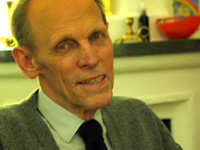Tiempo Climate Cyberlibrary
Interview with Bo Döös
- Tiempo archive
- Complete issues
- Selected articles
- Cartoons
- Climate treaty
- Latest news
- Secretariat
- National reports
- IPCC
About the Cyberlibrary
The Tiempo Climate Cyberlibrary was developed by Mick Kelly and Sarah Granich on behalf of the Stockholm Environment Institute and the International Institute for Environment and Development, with sponsorship from the Swedish International Development Cooperation Agency.
While every effort is made to ensure that information on this site, and on other sites that are referenced here, is accurate, no liability for loss or damage resulting from use of this information can be accepted.
 |
Bo Döös discusses the development of the first operational weather forecast model. |
|
To listen to the streaming audio or video files, you will need RealPlayer or Real Alternative, both free downloads |
|||
|
How did the first operational weather forecasting experiment start? |
|||
|
Low bandwidth |
|||
|
High bandwidth |
|||
|
What was the next step? |
|||
|
Low bandwidth |
|||
|
High bandwidth |
|||
|
Why was Sweden able to take the lead in operational weather forecasting? |
|||
|
Low bandwidth |
|||
|
High bandwidth |
|||
|
Who else was involved in the Swedish experiment? |
|||
|
Low bandwidth |
|||
|
High bandwidth |
|||
|
What was it like working with Professor Rossby? |
|||
|
Low bandwidth |
|||
|
High bandwidth |
|||
|
Biography |
|
Bo R. Döös was professor of meteorology at the University of Stockholm until 1970. |
|
He then became Director of the Joint WMO/ICSU Planning Staff for the Global Atmospheric Research Programme (1971-1982), Director of the WMO/UNEP/ICSU World Climate Programme (1980-1982), and Manager of the UNEP/WMO/ICSU assessment of the impact of an increased atmospheric concentration of radiatively active gases (1982-1986). |
|
From 1986 to 1988, he was Visiting Scientist at the US National Climate Program Office, responsible for the development of a five-year US National Climate Program. From 1988 to 1991, he was Deputy Director of the International Institute for Applied Systems Analysis and leader of its Environment Programme. |
|
At present, he is chairman of Global Environmental Management. |
|
Contact information |
|
Prof. Bo R. Döös, Global Environmental Management, Packhusgränd 6, SE-111 30 Stockholm, Sweden. Email: bo.doos@telia.com. Web: www.misu.su.se/~doos/bo/. |
Bright Ideas

General Electric plans to cut solar installation costs by half

Project 90 by 2030 supports South African school children and managers reduce their carbon footprint through its Club programme

Bath & North East Somerset Council in the United Kingdom has installed smart LED carriageway lighting that automatically adjusts to light and traffic levels

The United States National Oceanic and Atmospheric Administration and the American Public Gardens Association are mounting an educational exhibit at Longwood Gardens showing the link between temperature and planting zones

The energy-efficient Crowne Plaza Copenhagen Towers hotel is powered by renewable and sustainable sources, including integrated solar photovoltaics and guest-powered bicycles
El Hierro, one of the Canary Islands, plans to generate 80 per cent of its energy from renewable sources

The green roof on the Remarkables Primary School in New Zealand reduces stormwater runoff, provides insulation and doubles as an outdoor classroom

The Weather Info for All project aims to roll out up to five thousand automatic weather observation stations throughout Africa

SolSource turns its own waste heat into electricity or stores it in thermal fabrics, harnessing the sun's energy for cooking and electricity for low-income families

The Wave House uses vegetation for its architectural and environmental qualities, and especially in terms of thermal insulation

The Mbale compost-processing plant in Uganda produces cheaper fertilizer and reduces greenhouse gas emissions

At Casa Grande, Frito-Lay has reduced energy consumption by nearly a fifth since 2006 by, amongst other things, installing a heat recovery system to preheat cooking oil
Updated: May 15th 2015